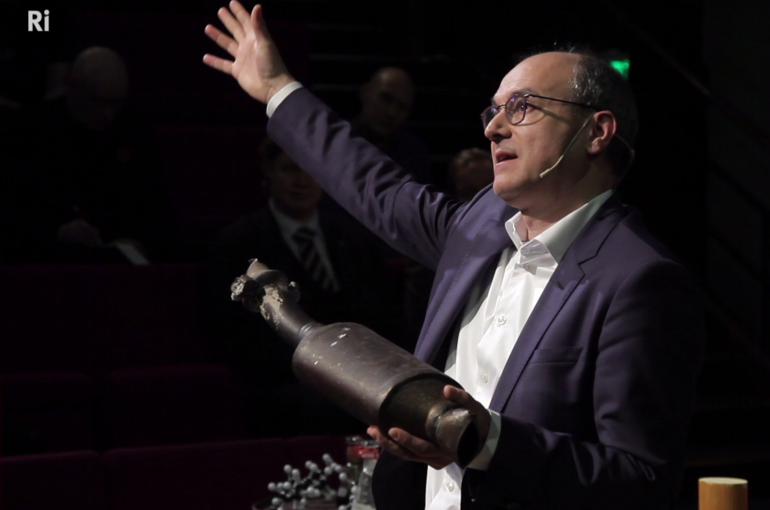Carbon to carbon: chemistry and legislation need to work together for a true circular economy
Lecture Bert Weckhuysen at Royal Institution London

Earth to earth, dust to dust, carbon to carbon: Bert Weckhuysen, Distinguished University Professor ‘Catalysis, Energy and Sustainability’, sketches the ingredients for a true circular economy. In his lecture at the Royal Institution in London, he explained how catalysis research can contribute to a cleaner world, and how politics and government need to play an essential part by introducing adequate legislation.
In his lecture, Weckhuysen takes his audience on a journey from the discovery of crude oil to our current problems with carbon dioxide, and the role of catalysis throughout this journey. Gasoline is made from crude oil with help of a catalyst, which cuts up large molecules to make a suitable fuel for car engines. Over the years, catalysts were developed to make fuels, plastics, and medicines. But these materials are also the root of problems like plastic waste and global warming caused by CO2. Fortunately, catalysts can also help us find solutions to these problems.
Acid rain
In the second half of the 20th century, acid rain was a major problem that plagued our environment. So why is nobody talking about it anymore? Acid rain was not a hoax: chemistry actually made important steps towards solving this problem, by introducing cleaner fuels and the automobile catalyst.
Carbon to carbon
In a similar way, catalysis can play a role in solving problems caused by plastic waste and CO2. Chemistry researchers like Bert Weckhuysen are working on catalysts that can turn waste and CO2 into useful building blocks for fuels and materials. We need different catalysts to solve different parts of the sustainability puzzle. Weckhuysen explains: “I see myself as a detective, using a magnifying glass to see what is going on in a chemical process. If you want to design the catalyst of the future, you need to really understand how catalysts work.”
Legislation
But chemistry is only part of the solution. Why is sustainable train travel more expensive than taking an airplane? One of the reasons is that legislation does not take into account CO2 emissions as an important factor. In the last decades of the 20th century, legislation was introduced to make automobile catalysts mandatory in cars, leading to a dramatic reduction of acid rain. Now, politics and governments need to take up the challenge and help make the transformation to a circular economy.
Bert Weckhuysen is Distinguished Professor ‘Catalysis, Energy and Sustainability’ at Utrecht University. He is scientific director of ARC CBBC, the Dutch national research center that investigates chemical building blocks for novel sustainable energy and materials, and the Gravitation Program MCEC, the Netherlands Center for Multiscale Catalytic Energy Conversion. The Royal Institution is an independent charity dedicated to connecting people with the world of science, in part by organizing public talks at their world-famous theatre in London. This lecture was made possible with the help of the Dutch embassy in London.

